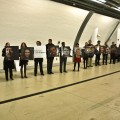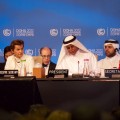The Morning After Stock-Take
Sophie Trevitt | December 8, 2012.
It’s Saturday, noon, in Doha, Qatar on what is hopefully the last day of the UN climate change negotiations that were meant to finish on Friday. The only UNFCCC announcement reads “informal plenary – time to be announcement” has not helped with the confusion evident in the faces of party delegates, civil society observers and press alike. As we await the final stock-take of proceedings, here’s an update on what has happened so far: The stock-take is when the President calls upon the chairs of the different negotiating streams to report on the work completed thus far. He prefaced with a word of caution that rather than becoming caught up details, the success of Doha should be judged according to “an overall balance package that allows Doha to be active gateway to increase climate action.” With this in mind, the chair of the Kyoto Protocol negotiations took the floor and reported back on the parties’ responses to a new text that was drafted last night. “There were several important concerns about the content but at the same time I think I can say that there was appreciation that a certain text was presented.” Although, he added: “There is a way to go.” The chair indicated that the text would be revised, taking into account as many of the concerns as possible. He expressed his concern that the negotiations needed to be concluded today, Friday, which meant that dialogue should be limited only to the most important issues. He highlighted the interconnectedness of the negotiating streams and that a strong outcome under Kyoto was largely dependent upon the outcomes of the negotiations on the Durban Platform and the discussions on long-term co-operative action. The European Union similarly indicated its desire to engage ministers in discussion about an integrated package deal rather than the individual streams in isolation. “The EU believes strongly that we now need the opportunity for ministers to capture the overall package and allow them to engage in cross track negotiation. We need to secure a package that will deliver ambition across the board that will deliver pre-2020 ambition.” Finance was the next issue on the agenda. The Minister appointed by the COP President to carry out consultations with negotiators reported back that significant disagreements continued between parties despite a spirit of compromise. He stated that discussions would continue during the afternoon and the text would be revised before presentation again. The chair of the long-term negotiations delivered a hopeful report back despite the slow progress and persistent disagreements that have characterised work under the work stream so far. “We have worked hard and through the night to try and streamline and revise the pieces of text accordingly; working with the complex and lengthy texts and trying to put them in an orderly fashion that reflects the concerns of parties.” He highlighted the issue of finance as a key and important outcome of the long-term co-operative action negotiations. There is currently only a placeholder, and no substantive text, on finance in the draft agreement. “On everything else I would say that we were aiming to have a balanced compromises within each issue and across the issues all together.” The chair of the Durban Platform definitively delivered the most hopeful report back. He acknowledged they are only in the first year of what is supposed to be four years of work, and indicated that consultations with parties who held divergent views were constructive. The key issues discussed were adaptation and a need for increased ambition. In contrast, the Minister reporting on loss and damage indicated that none of the amendments that had been put on the table were accepted by the parties. Still, the chair expressed optimism that a compromise could be reached. “We are still in the middle of this process and I believe closing the gap of the divergent views of the different groups is indeed near.” Party responses to the report backs were varied. As a whole they demonstrated a common willingness to conclude the negotiations but significant roadblocks were acknowledged. The strongest statements were delivered by the G77 and China conglomerate. China, on behalf the BASIC group, expressed the view that despite “common and hard efforts” there remain too many unresolved issues for the progress to be considered satisfactory. It pinpointed the lack of certainty around finance under the long-term stream, and equity and ambition under Kyoto as critical obstructions to an agreement. Similarly, Gambia on behalf of the Lesser Developed Countries stated unequivocally that they would not be pressured into an agreement in the name of expedience. “We are here representing millions of people who are suffering and we want to go home with something of substance.” Venezuela expressed its objections to being left out of the consultative process. Venezuela objected that if parties were to agree to what was currently on the table, it would effectively returning to a pre-Copenhagen state of affairs. Venezuela particularly pinpoints the scientific insufficiency of developed countries’ mitigation commitments, lack of ambition and lack of certainty surrounding finance. Finally, the overall sentiment of the negotiations was captured by another impassioned speech of the Philippines. “Confronting climate change and trying to make this world a better one is so much more than ourselves. It is about what our children will inherit from us. Can I look my daughter in the eye, my son in the eye and say I did the best I could? As we sit here at this stage, in this session, can we honestly say to our children – I did my best.” We also heard from the Ministerial Outreach on technology and reporting guidelines, both of which indicated that agreements between parties had effectively been reached. The President concluded by stressing that time was of the essence. He joked that unlike the delegates who had travelled all over the world to attend, he lived a mere ten minutes down the road and was happy for negotiations to continue as long as parties wished. The stock-take closed with him, once again, evoking a spirit of compromise. “None of the commitments will be perfect, none of you will be completely satisfied. In order to reach agreement on outstanding issues it is important that we do not look at issues in isolation, let’s look at it as a package that satisfies everyone. We have no time left. We must now resolve the few outstanding issues. I will urge all the parties make the final push in delivering success in Doha.” By Sophie Trevitt, photo by Laura Owsianka.












comment